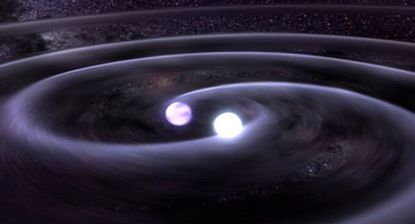What are gravitational waves and why are they important?
Discovery hailed as this century's biggest scientific breakthrough that could answer questions about the Big Bang itself

Scientists have today confirmed the existence of gravitational waves – exactly a century after they were first predicted by Albert Einstein.
"Their discovery... is certain to earn a Nobel Prize," said The Guardian's science editor, Ian Sample.
What are they and who has been looking for them?
Subscribe to The Week
Escape your echo chamber. Get the facts behind the news, plus analysis from multiple perspectives.

Sign up for The Week's Free Newsletters
From our morning news briefing to a weekly Good News Newsletter, get the best of The Week delivered directly to your inbox.
From our morning news briefing to a weekly Good News Newsletter, get the best of The Week delivered directly to your inbox.
Gravitational waves represent movements in the fabric of space-time created by major cosmic events, such as the collision of black holes. They can be likened to ripples in a pond.
Their existence was first proposed by Einstein and formed a key part of his general theory of relativity, but they have never before been detected.
However, in recent weeks, rumours began circulating that the decades-long search was over. Hundreds of scientists working on the Advanced Laser Interferometer Gravitational-Wave Observatory experiment in Washington State have been using laser detectors to seek out the cosmic ripples.
"They have constructed [two] tubular channels several kilometres long, down which they fire laser beams that bounce off a mirror at the far end," says the BBC's Phillip Ball.
"A gravitational wave would change one channel length more than the other, depending on its direction, slightly altering the interference between the two beams."
Why have they been so hard to find?
Because of the small size of the displacement created by the ripple, says The Guardian. "A wave from millions of light years away would distort a four kilometre laser beam by less than a thousandth of the diameter of the nucleus of an atom. Which is hard to spot."
Why are they important?
Their discovery, confirmed this afternoon, has been hailed by scientists as "the biggest scientific breakthrough of the century". It's claimed the find is even more significant than the discovery of the Higgs boson and marks the "birth of gravitational astronomy", says the Daily Telegraph.
"Quite apart from offering a completely new vindication of Einstein's theory, these results will deepen our understanding of stars and galaxies," British cosmologist Sir Martin Reese writes.
It could also answer fundamental questions about the moment of creation. "It will give a window into some of the most violent and energetic events in the cosmos; exploding stars, colliding black holes, maybe even the Big Bang itself," says Professor Martin Hendry, from the University of Glasgow.
[[{"type":"media","view_mode":"content_original","fid":"90708","attributes":{"class":"media-image"}}]]
Create an account with the same email registered to your subscription to unlock access.
Sign up for Today's Best Articles in your inbox
A free daily email with the biggest news stories of the day – and the best features from TheWeek.com
-
 6 queer poets to read whenever but especially now
6 queer poets to read whenever but especially nowThe Week Recommends April is National Poetry Month
By Scott Hocker, The Week US Published
-
 How women's pain is often ignored in health care
How women's pain is often ignored in health carethe explainer The gap in care is especially glaring compared to how men are treated
By Theara Coleman, The Week US Published
-
 6 serene homes in Vermont
6 serene homes in VermontFeatures Featuring a four-level Shaker barn in Hartland and a Scandinavian-inspired home in Stowe
By The Week US Published
-
 Why the Moon is getting a new time zone
Why the Moon is getting a new time zoneThe Explainer The creation of 'coordinated lunar time' is part of Nasa's mission to establish a long-term presence on Earth's only natural satellite
By Richard Windsor, The Week UK Published
-
 We're in the golden age of space exploration
We're in the golden age of space explorationIn depth To infinity and beyond!
By Devika Rao, The Week US Published
-
 All the major moon landings so far
All the major moon landings so farThe Explainer One giant leap for mankind
By Devika Rao, The Week US Published
-
 Jupiter's Europa has less oxygen than hoped
Jupiter's Europa has less oxygen than hopedspeed read Scientists say this makes it less likely that Jupiter's moon harbors life
By Peter Weber, The Week US Published
-
 'Magnolias in space': why scientists have created the world's first wooden satellite
'Magnolias in space': why scientists have created the world's first wooden satelliteUnder The Radar New Japanese probe could help tackle 'graveyard of space junk' encircling Earth
By Chas Newkey-Burden, The Week UK Published
-
 The moon, it's shrinking!
The moon, it's shrinking!The Explainer Landing on the moon is soon going to be harder than previously thought
By Devika Rao, The Week US Published
-
 13 recent scientific breakthroughs
13 recent scientific breakthroughsIn Depth From photos of the infant universe to an energy advancement that could save the planet
By Devika Rao, The Week US Published
-
 What is NASA working on?
What is NASA working on?In Depth A running list of the space agency's most exciting developments
By Devika Rao, The Week US Published